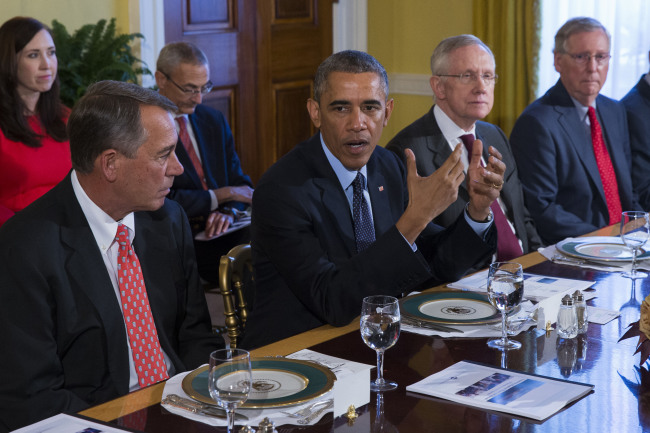WASHINGTON (AFP) ― U.S. lawmakers return to Washington on Wednesday for their first session since Republicans routed President Barack Obama’s Democrats, facing the threat of yet another tough budget fight.
Funding next year’s government operations could emerge as a flash point in the “lame duck” session between last week’s midterms and the arrival of newly-elected and reelected members on Jan. 3.
In September, lawmakers punted on negotiating a federal spending bill, instead passing a continuing resolution that only funds government until Dec. 11.
 |
U.S. President Barack Obama speaks with House Speaker John Boehner (left) and Senate Majority Leader Harry Reid (right) in the Old Family Dining Room of the White House in Washington, D.C., Friday. (AP-Yonhap) |
Democrats, who will lose their Senate majority in the new Congress, would prefer to pass an “omnibus” spending package to fund federal operations through September 2015, the end of the fiscal year.
Such a package is reportedly already under negotiation and passing an omnibus would prevent another all-out war over spending like the one that shuttered government for 16 days in October 2013, a crisis largely blamed on Republicans.
One day after the midterms the Republican leader in the Senate, Mitch McConnell, eager to show his party’s competence in governing in the run up to the 2016 presidential race, indicated he had no stomach for repeat fiscal showdowns.
“Let me be clear: There will be no shutdowns and no default on the national debt,” McConnell said.
But his party’s conservative flank will push for a short-term continuing resolution so that more austere spending can be negotiated early next year when Republicans control both chambers of Congress.
An omnibus bill would mean Republicans would not be able to use must-pass legislation to exert leverage.
Conservatives have indicated they want to attach other measures to spending legislation, such as a repeal of the health care law, rollbacks of environmental and energy regulations or approving construction of the long-delayed Keystone XL oil pipeline.
Such a move would force Obama to either sign legislation deflating some of his key achievements, or veto it and set up another fiscal showdown.
While Republican House member Aaron Schock told AFP he does not expect Obama “to roll over and play dead” in 2015, Republicans will be “in a better position to negotiate with the president.”





![[Exclusive] Hyundai Mobis eyes closer ties with BYD](http://res.heraldm.com/phpwas/restmb_idxmake.php?idx=644&simg=/content/image/2024/11/25/20241125050044_0.jpg)
![[Herald Review] 'Gangnam B-Side' combines social realism with masterful suspense, performance](http://res.heraldm.com/phpwas/restmb_idxmake.php?idx=644&simg=/content/image/2024/11/25/20241125050072_0.jpg)

